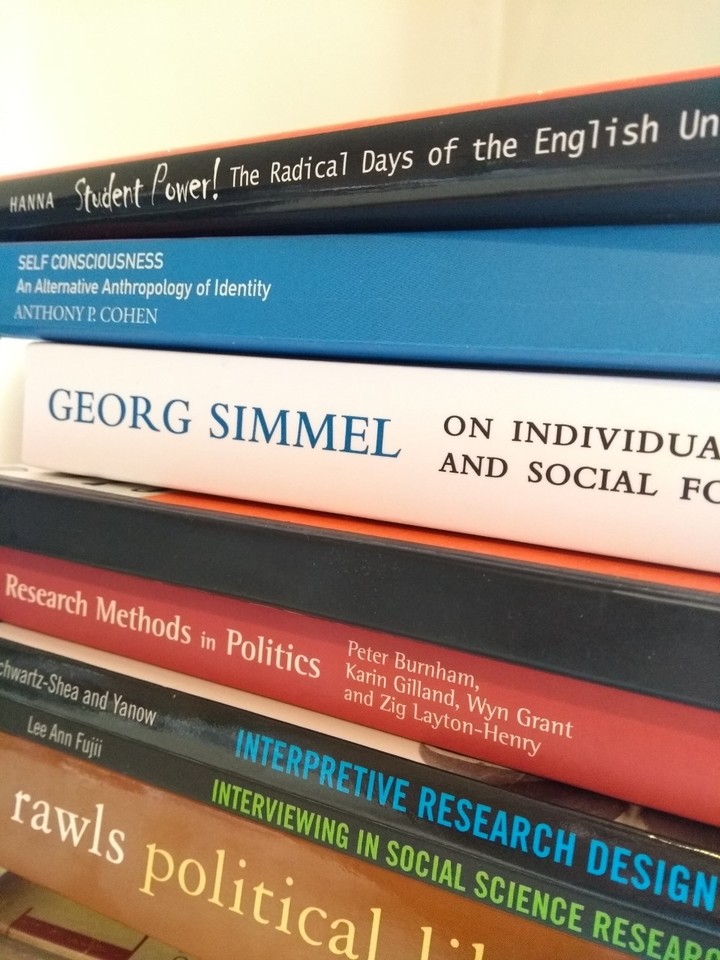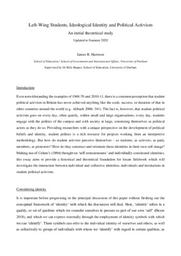Your literature review from home: tips, tricks, and thoughts for the way forward in the time of COVID-19

We should all be relieved to see that, at least for now, apparently declining infection and death rates from the COVID-19 pandemic are making it possible for life to begin to return to normal in many parts of the world. For Laidlaw Scholars in several countries (including the UK), however, the obstacles to conducting research presented by continued lockdown are very real and present, and are likely to affect several important aspects of our capacity to undertake wide-reaching research with real-world applications. Access to university buildings, and therefore often IT facilities and physical texts not available online, not to mention vital lab space and materials, is frequently restricted, and in-person contact with staff, researchers and other Scholars is for the most part impossible.
Although perhaps the most evident consequence of this in research terms takes the form of restrictions on lab work and fieldwork, lockdown also presents challenges for those conducting text-based secondary research, the number of whom is likely to be increased by the restrictions on other forms of research. Especially for Laidlaw Scholars who are starting their journey in the programme this summer, and therefore don’t have even a previous summer’s reading and research on which to fall back for inspiration, the prospect of undertaking a literature review from home, without access to university facilities and the academic community around their departments, is not necessarily an appealing one.
Before lockdown was even a glint on the horizon, I made some notes on a post I wanted to write for the Network, listing my best advice for conducting a literature review as part of a Laidlaw project, to be written up and published some time around now, when Scholars were most likely to be starting out in their research for the summer. The changing situation, however, has made many of the suggestions I had planned on making anything from difficult to downright impossible. Instead, in this post I will take the original notes I made on conducting a literature review and try to adapt them to find solutions to the difficulties presented by lockdown; in doing so, I can hopefully suggest some ways in which Scholars perhaps starting their first full literature review this summer can benefit from good practices throughout their period of research.
1) Find your rhythm
This is probably the most important suggestion I could make about the actual work of conducting a literature review: pay attention and learn your own workflow and patterns. Completing a literature review can be monotonous work, so learning how to work at your best can make the difference between wonderful and terrible experiences. The ability to quickly learn a text’s tempo can be really helpful, too: sometimes you’ll find a book which is dense but which you can read all day, whereas sometimes even the shortest article or introductory chapter can be too much to handle after even a few pages – so knowing when to put a text down and move on for the day can help you get the most done possible.
This point doesn’t take a lot of adapting to a lockdown situation. Working from home, it can be extremely tempting to let your self-discipline slide and lose your motivation to actually pick up a book or download an article and actually read – I’m guilty of this as much as anyone else. So finding your rhythm can be even more important than usual. Figure out when it’s best for you to take breaks and learn to know when you’re not in the mood to work – some people can roll straight out of bed and start reading but others need a little bit more time to get going, for example. You should also learn to recognise that cut-off point in your day when your attention starts to wander, and you know that you won’t get any more good work done that day: pushing yourself beyond that point only means that you’re going to burn yourself out for the sake of sub-par work. Generally speaking, it’s just important to practise self-perceptiveness and reflectiveness, in order to find your best working patterns and maximise your productivity while also ensuring that you enjoy your experience to the greatest extent possible.
2) Give yourself a change of scenery
Staying in the same place for too long can be dangerous. Even setting aside the impact that confining ourselves to a single setting in which to do our research (a real and present danger when conducting a literature review) can have on our thinking and ability to develop new ways of looking at issues, I have always found that my productivity takes a dip after a few hours of non-stop work at a desk, be it at home or in my research workspace in my department. Although taking a break is one way to address this issue, it’s also important to give yourself a change of scenery throughout your day (for example, take a walk and get some lunch or a cup of coffee) and, indeed, on a day-by-day basis throughout your research project. During my research period last summer, I tried my best to get away from the office at least twice through the working day, even if just to take a walk around town; later, I returned home from Durham for a week and scouted out useful books of which Durham didn’t possess a copy using SCONUL (a UK service allowing students access to other universities’ libraries, especially outside of ordinary university terms) access to my hometown’s university libraries. A chance of scenery as drastic as this can also be refreshing, as well as offering you access to different resources and research settings.
Obviously, such drastic changes are practically unavailable in lockdown; this doesn’t mean, though, that we can’t give ourselves a little bit of variety in our workplace settings. This can be as simple as making sure that you actually get up and move around throughout your day, both by getting physical exercise and by trying to take your breaks away from your desk, somewhere else in your home or outdoors. Chaining yourself to your desk even in time intended for recreation can, like burning yourself out by working past the point where your productivity starts to drop, reduce your ability to do good work and stifle your ability to think creatively and laterally about the issues being raised by your research. Instead, make sure you move around throughout your day, try to take breaks away from your desk and, if possible, try to change your place of work within your house, so that you don’t get trapped in narrow patterns of thinking and demotivation.
3) Use your surroundings
I think it’s difficult to overstate the importance of learning to use the academic networks already present around you for writing a good literature review. Especially if your research setting is predominantly going to be a university department, lab, or library, academics and researchers already in post and the networks surrounding them can be a huge source of support and inspiration for Scholars working on a literature review and, even if you aren’t even considering a career in academia, involving yourself in campus academic networks (and even those extending to other institutions) can help build connections and soft skills which are useful in any career, as well as offering insight into the ways in which large professional organisations can operate.
Although quarantine has meant that these networks aren’t functioning in the normal way – there are no shared research workspaces, it’s more difficult to hold collaborative academic events, and colleagues aren’t working from physical offices down the corridor – this doesn’t mean that they’ve completely ceased to function. Between online calls and meetings on platforms like Zoom and Microsoft Teams, the collaborative functions of real-time document editing in Google Docs and other services, and the increasing adaptation of previously in-person academic events to digital existence, it’s still possible to get many of the most engaging parts of working within an academic network of support and experience, even if some aspects don’t adapt so well to digital life.
4) Don’t be a stranger
As useful as academic networks and support can be, it is also important to value social interaction while conducting your research. Composing a literature review under ordinary circumstances can be an immensely solitary job, and it’s important that we interact with our fellow Scholars, who are often some of the very few students resident at university during the summer. Both organised and impromptu social events between Scholars can help to reinforce the feeling of community within local cohorts of the programme, as well as keeping Scholars socially active during their research periods.
Clearly, lockdown presents new challenges for arranging and maintaining social contact between Laidlaw Scholar peers. I’m pleased to be able to say that my own Laidlaw cohort at Durham tend to get along very well and be quite socially active, but even for them attempting to organise digital social interaction throughout the pandemic period has been difficult, given the variety of time zones and key worker statuses between our Scholars, as well as the general difficulties of attempting to organise social interaction between a large group of people online. Nevertheless, social interaction still has the potential to drastically improve a relatively solitary literature review experience from home, and the investment of time and energy into arranging this will be completely made up for by the rewards: don’t be afraid to get in touch with your peers and previous cohorts of Laidlaw Scholars for both support and social reasons: it’s very likely that they’ll be facing the same challenges as you are!
5) Read around
This is perhaps an unnecessary point to make in a blog post for other Laidlaw Scholars, but to me it’s a really important one: a literature review can be a lot more enjoyable and productive if you are flexible and innovative in the way in which you plan and structure your reading. When composing a literature review, the temptation can be to just focus quite dogmatically on the texts which appear to be of immediate usefulness in characterising the existing literature around your topic area. While there’s nothing wrong with this per se, doing so risks missing some of the texts and perspectives which have the potential to elevate your research to the next level, and not making the best use of the freedom which the long research period and full-time work of the Laidlaw programme offers. Although of course it’s important not to get distracted from the overall aim of your research, there’s nothing at all wrong with going down a few citation rabbit-holes and exploring the space around your topic of interest. This in itself requires really no adaptation to a working-from-home situation. Don’t be afraid to go a little off-the-wall in your reading: you have plenty of time to expand your horizons and one good, innovative sentence in a text which doesn’t immediately seem relevant to your exact research project can provide some of the most useful and groundbreaking inspiration for the very best research.
As we move forward into whatever the summer may hold for Laidlaw researchers and for the world at large, I can only hope that this post provides some inspiration or helps someone make the most out of their literature review work, even in challenging circumstances. I wish everyone the best of luck and good health this summer and that everyone's research and leadership activities go as well as possible!




Please sign in
If you are a registered user on Laidlaw Scholars Network, please sign in
Hi James,
Great article, thanks for posting! I especially agree with 4) - so important to maintain your friendships and try to connect with people and check in on your colleagues, especially during this period of lockdown when we know so many are feeling isolated.
Best of luck with your research this summer, and I look forward to seeing the outcome!
What a wonderful article, James! Thanks so much sharing this!